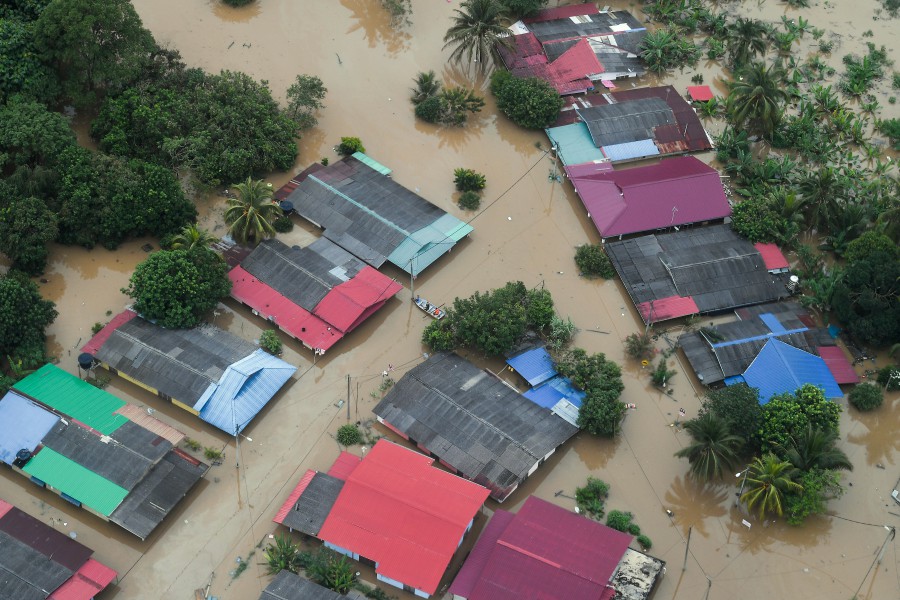
Aerial view of flood situation in Termerloh, Pahang yesterday. — Bernama
LARGE-SCALE rainfall-floods have become an annual event in Malaysia, affecting the livelihoods of thousands of people. According to the Welfare Department, the number of flood victims in 2018 and 2019 were 42,467 and 61,744, respectively.
For 2020/2021, the number is expected to be higher than 2019.
Up to Jan 7, more than 20,000 people have been evacuated due to floods that mostly affected Pahang, Johor and the east coast states, and the number is expected to further increase.
The economic impact due to floods is large. A study by Universiti Malaya researchers showed that the 2014 floods in Terengganu was estimated to have reduced the potential gross domestic product by 1.5 per cent. What can we learn from the past?
Learning from the responses of frequent rainfall-flood requires different approaches to reduce the economic risks and protect employment livelihoods. The multitude of people affected by dramatic flood shocks is evidence of our inadequacy in dealing with such events and signals that we must find new ways to decrease the economic burden on those affected.
Empirically, poor and rural areas are more prone to flood risks compared with wealthy or urbanised areas. Poor and rural workers are likely to be employed in the informal sector with less social protection. Hence, there is a link between flood and poverty, one that can lead the poor to become trapped in a cycle of poverty and exposure to flood shocks.
As far as employment livelihood is concerned, the following questions related to the employment consequences of floods must be addressed.
Do workers have a valid reason for not turning up for work? There are many reasons why workers are not present for work in the event of a flood. For example, they may be ill, disconnected from the workplace or do not have a place to live as their homes have been damaged.
What happens if a worker comes to work, but is unable to carry out duties? In certain situations, workers can still turn up for work during a flood, but they are unable to carry out their duties because the particular businesses are affected.
So employers may ask workers to take additional leave. This leave essentially would have to be paid, but may not be practised in reality for several reasons, such as the informal nature of the business and uncovered clauses in their employment contract.
Can employers cut wages if workers are unable to turn up for work? Employers are likely to take two unwelcome actions: cutting wages or not pay the workers during the periods of inability to work. Contract workers with daily-basis payments are likely to be affected the most.
There may be no legal obligation for employers in the informal sector to pay workers that do not turn up for work. What should employers do following a flood? The recent floods necessitate the need for employers to put in place adequate policies, e.g. specific insurance for natural disaster, to fully deal with this situation if it occurs again.
Floods affect employment in two ways: direct effect or immediate consequences, and indirect effect that are linked through economic inter-linkages. Do we have enough safety net programes to reduce the burden on workers due to floods?
We know that certain schemes for flood insurance or catastrophe insurance are available. However, they are mainly designed to provide an alternative to disaster assistance to reduce the escalating costs of repairing damage to buildings and replacing their contents. Hence, it is partially to help in the recovery of a household without considering employment survival due to income and job losses.
As far as resilience is concerned, the available flood insurance cannot support the economic and income losses due to floods. In our view, it is timely to consider the development of an active assistant programme, maybe in the form of employment insurance that is able to compensate the income and job losses due to floods. This should also be applied and expanded to other professions affected by rainfall-related events, such as fishermen and rubber tappers.
In our view, the option for having employment insurance programmes related to natural disasters has several advantages: Reducing government fiscal burden in sustainable ways; strengthening active labour market policy interventions by including natural disasters; and, indirectly increase the formality of business for monitoring purposes.




